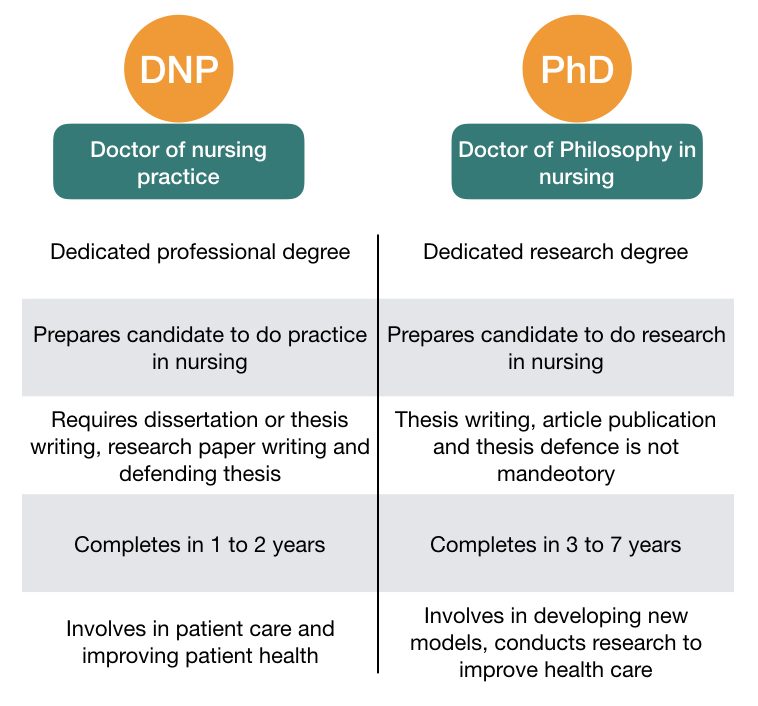Nurses with doctorates are referred to as the doctor of philosophy in nursing or doctor of nursing practice, PhD in nursing and DNP, respectively.
We have written a series of articles on the present topic, “nursing” the reason is high demand and more earning options. Nursing is popular and common among students but unfortunately, students never go for higher education in nursing.
Students leave their studies after BNP or MNP or after graduating in nursing because a decent job is waiting!
Fortunately, there are more career options and more earning opportunities are waiting for nurses with doctorates. Studies suggest that fewer nurse graduates go for PhD or doctorate in nursing. The reason is known to us.
If a student takes a wise decision to go for a PhD or doctorate in nursing they can make their life even more comfortable.
There are two options for doing higher studies in nursing one is a PhD in nursing while the other is a doctor of nursing practice. Although requirements for either degree are similar, the outcomes are responsibilities of a fellow after completion of a degree are different.
Major differences between either are explained in the table below,

From the above comparison, you would understand which program is best for you. The major differences between a doctor of nursing practice and PhD in nursing and their roles in healthcare, career options and earning opportunities are explained in the present article.
Here in the present content, we will also answer some questions related to nursing with doctorates.
Note: We will consider DNP and PhD in nursing both as a higher level of a doctorate degree from now.
What are the responsibilities of nurses with doctorates?
Nurses with either doctorates have gigantic responsibilities in their organization. BSN or MSN have to look after routine hospitality and medication. They directly consult doctors for further assistance and they only have to follow instructions given by the doctor.
However, the role of PhD degree holder is totally different.
- They assist the nursing staff.
- They monitor the overall patient care system and inform higher management.
- They find problems or gaps in the existing system and try to find a solution for that.
- They are constantly working to improve the quality of the overall care system.
- They do conduct research on healthcare, publish research and avail funds for the organization.
- They conduct quality improvement workshops, skill improvement seminars and teach nurses.
- They train staff for better healthcare services.
- They do research as well as teach nursing students.
Are nurses with doctorates called doctors?
Yes. Technically and practically the answer for the present question is yes.
Doctorates with a PhD degree or any other doctorate degree can use “Dr” above to their name because they have done some substantial research and found something new in their field.
The doctor of nursing practice and PhD in nursing prepares candidates for healthcare and academics and either degree is the highest level of honor in the education system therefore nurses with doctorates can use ‘doctor’ honor.
How much do nurses with doctorates can earn?
Nurses with either doctorate degrees can earn between $85,000 to $1,50,000 or more per year in the USA. Although earning possibilities may vary based on positions and their experience. Some of the common nurse job and their earnings are enlisted here:
| Job option | Salary (annual) | Required degree |
| Clinical nurse specialist | $65,000 to $1,10,000 | DNP |
| Nurse Anesthetist | $1,81,000 to $1,87,000 | DNP |
| Family Primary care nurse practitioner | $1,09,000 to $1,18,000 | DNP |
| Leader of nursing staff | ~$1,00,000 | DNP |
| Pediatric Primary care nurse practitioner | $1,03,873 to $1,23,718 | DNP |
| Adult- Gerontological Acute Care Nurse Practitioner | $82,000 to $1,20,000 | DNP |
| Nurse tutor | $68,987 | PhD in nursing |
| professor/ lecturer or tutor | $96,580 | PhD in nursing |
| Nursing consultancy | Depends on experience | PhD in nursing or DNP |
| Nurse scientist | $81,501 to $95,000 | PhD nursing |
Note: the salary or earning data are taken from the USA.
What are the job opportunities for nurses with doctorates?
Based on which honor they hold, nurses with doctorates have numerous topmost and prestigious job opportunities. Some of them are enlisted here;
- Clinical nurse specialist
- Nurse Anesthesiology
- Family Primary care nurse practitioner
- Leader of nursing staff
- Pediatric Primary care nurse practitioner
- Adult- Gerontological Primary Care Nurse practitioner
- Adult- Gerontological Acute Care Nurse Practitioner
- Nurse tutor
- professor/ lecturer or tutor
- Nursing consultancy (online and offline)
- Nurse scientists
Nurses with DNP and PhD degree:
| DNP | PhD in nursing |
| Clinical nurse specialist Nurse Anesthesiology Family Primary care nurse practitioner Leader of nursing staff Pediatric Primary care nurse practitioner Adult- Gerontological Primary Care Nurse practitioner Adult- Gerontological Acute Care | Nurse tutor professor/ lecturer or tutor Nursing consultancy (online and offline)Nurse scientists |
Clinical nurse specialist:
The clinical nurse specialist is the position reserved for nurse doctorates in management of the institute, organization or hospitals whose responsibilities are to take care of overall patient health.
They give direct patient care, consult or teach staff and take active decisions in inpatient health care. They also consult nurse scientists to improve the quality of the hospital care system.
They lead a team and develop SOPs and policies for the hospital. Clinical nurse specialist is one of the most common positions for the DNP degree holder.
Nurse Anaesthesiologist:
The primary responsibility of the nurse Anesthesiologist or nurse anesthetist specialist is to administer the dose, activity and effect of anesthesia during any medical procedure, operation or surgery.
They operate anesthesia on a patient in close coordination with a surgeon or doctor.
Family Primary care nurse practitioner:
Commonly known as FNPs can prescribe medications, counsel patients and their family members, diagnose and treat patients and their family members if needed and take care of overall patient health.
They also maintain a patient record, examine them physically in routine and perform or order a laboratory test.
Leader of nursing staff:
As a leader of nursing staff at an organization, the DNPs work in the higher management and look after nursing faculties in hospital. They recruit, train, lead and monitor the nursing staff. Also closely monitor their progress as well as the overall quality of healthcare.
Pediatric Primary care nurse:
The pediatric primary care nurses administer children in the pediatric department. They are trained children (pediatric) health experts taken care of medication, prescription, testing and overall health of children.
To do so they assist pediatric experts and help in pediatric surgeries as well. PPCNs also counsel patients’ parents too.
Adult- Gerontological Primary Care:
The role of Adult-Gerontological Primary care is much similar to Primary health nurse expert or nurse expert. They generally perform routine checkups, immunization and assessment.
Usually, they counsel and educate patients, their families and nurses too.
Nurse practitioner:
The nurse practitioner is positioned in higher management and performs various roles much like the nurse leader. They take care of overall nursing staff and patient care.
Adult- Gerontological Acute Care:
Their duties are to assist adults and elder patients in acute and chronic conditions as well as in critical care.
Nurse tutor/educator/ professor or lecturer:
PhD in nursing degree holders can get a job as nurse tutor/educator/professor or lecturer. Their major responsibilities are to teach students (graduate and postgraduates), tutor nurses, assist nurse practitioners, and perform other academic activities.
They are more involved in academics rather than clinical care. They also guide other PhD candidates as well.
Nurse scientists and researchers:
Nurse scientists and researchers perform various researchers to improve overall healthcare, patient care and the hospital care system.
Nurse scientists work in close coordination with a nurse practitioner to solve problems associated with healthcare. They find gaps in the existing system, conduct research and avail funding opportunities to the organization.
Conclusion:
Nurses with doctorates are less but are higher in demand. Though they have to endure many responsibilities, the earning potential is more. They are also honored at work as they are doctors of their subject.
If you are a nurse or in the nursing field, don’t focus on getting a job only, go for higher studies instead and pursue a doctorate degree. There are many opportunities in India, USA, UK and Australia.




